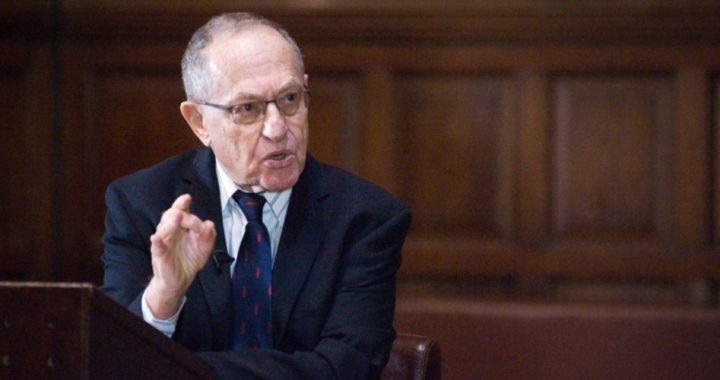
Alan Dershowitz (shown), the famed Harvard Law professor, expressed concern on Wednesday that Special Counsel Robert Mueller will go after President Trump on an obstruction of justice charge, because Mueller has nothing “really substantial.”
“A great worry is that because [Mueller] doesn’t have anything really substantial, he may go after obstruction of justice, which would create a constitutional crisis,” Dershowitz said on America’s Newsroom in response to reports that Mueller is interviewing Trump Cabinet officers, including Attorney General Jeff Sessions. Mueller is expected to interview Trump himself soon.
Dershowitz is a lifelong Democrat, but he has been a frequent critic of Mueller’s investigation and is generally a foe of the entire Special Counsel system. As an example of the inherent problems in the system of naming “special counsels,” Dershowitz noted that since Mueller apparently has nothing, he is now going after what Dershowitz called “low-hanging fruit” by delving into matters “not directly related to the thrust of the investigation.”
There is a history of special counsels expanding their investigations beyond their original charge, or focusing on “process crimes” such as lying to investigators or obstruction of justice. Special Counsel Ken Starr widened his investigation of President Bill Clinton’s alleged misdeeds in the Whitewater affair to include his committing perjury in an unrelated matter involving White House intern Monica Lewinsky. During the George W. Bush administration, Vice President Dick Cheney’s chief of staff faced jail time for lying about a crime with which he had no apparent involvement.
Dershowitz told America’s Newsroom that he had yet to see any evidence of “crimes being committed near the Oval Office.” Although prominent Democrats such as Senator Diane Feinstein (D-Calif.) have boldly said that firing FBI Director James Comey constituted obstruction of justice, Dershowitz does not agree, saying, “Firing Comey, telling Comey not to investigate [Michael] Flynn, those are all within the president’s constitutional authority. The other place it may be going is toward collusion, but collusion is not a crime.”
He added that the fact that Trump had not pardoned Flynn was a strong argument against Trump having committed obstruction of justice. This would have prevented General Flynn from cooperating with Mueller’s investigation. “The president would have had the complete authority to do so and Flynn never would have been indicted, never would have turned as a witness against him.”
Moreover, as we pointed out in our article about Flynn, “Flynn Plead Deal: Proof of Collusion? Not Even Close,” Flynn has admitted to having lied about having had contact with the Russians after the election, not before. His contacts were not only not illegal, they were intended to reduce international discord with Russia, discord intentionally caused by President Obama right before he left office, and they are the type of thing that incoming presidential administrations commonly do.
What Dershowitz does believe should be investigated, however, is the allegations of abuses within the Federal Bureau of Investigation. “Every civil libertarian, whether a liberal or conservative, should be concerned about abuses from within the FBI,” he said.
Back in December, Dershowitz argued, “You cannot charge a president with obstruction of justice for exercising his constitutional power to fire Comey and to tell the Justice Department who to investigate and who not to investigate.”
At the time, Dershowitz offered historical examples, going back to President Thomas Jefferson’s pursuit of former Vice President Aaron Burr early in the 19th century. More recently, Dershowitz noted, “George Bush, the first, pardoned Caspar Weinberger in order to end the investigation that would have led to him.” He added, “Nobody suggested obstruction of justice.”
Dershowitz contended that for there to be an actual case of obstruction of justice, either Congress or the courts would have to demonstrate “clearly illegal acts” on the part of Trump. He offered as an example former President Richard Nixon paying “hush money,” telling people to lie, and destroying evidence during the Watergate scandal.
The Office of Independent Counsel is a repudiation of both the doctrine of separation of powers and the principle of limited government. The Special Counsel is not elected by anyone, and even though President Trump could, in theory, fire him, such an act would be portrayed by the liberal media as somehow illegal. The history of special counsels demonstrates that power tends to corrupt, as noted by British statesman Lord Acton in the 19th century.
Photo: AP Images



